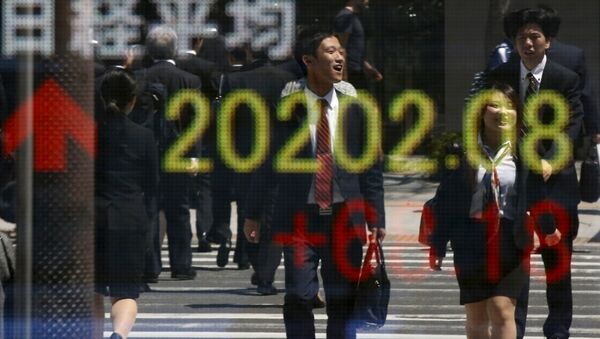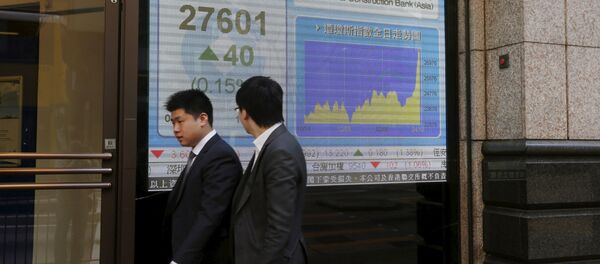Tuesday's trading in Asia-Pacific saw solid gains in most indices, however, regional stocks are poised to decline overnight, affected by the bearish sentiment on Wall Street. The US Federal Reserve policy meeting, starting later on Tuesday, is only adding to investors' nervousness. The MSCI Asia-Pacific Index, having added 0.3% in Tokyo during the session, lost 0.5% overnight, exposed to US pessimism.
The earnings season, still in full swing in Asia-Pacific, is generally more optimistic than that in the US, with local enterprises posting encouraging figures, triggering more buying bets as a result. However, mainland China's exacerbating weakness is potentially a destabilizing factor.
Chinese shares retreated 1.4% on average. In Shanghai, Jiangxi Copper Co, the metal producer, shed some 4.3%, having reported a 61% loss in its Q1 profits. PetroChina Co., the energy company, dropped 5.5% in Hong Kong after posting historically low earnings. The Shanghai Composite Index retreated 1.1% at the end of the day. To make things worse, trading volumes in both Shanghai and Shenzhen were nearly at a record high, and the volatility level jumped to its 5-year high, meaning the Chinese stock market is in the middle of a huge bout of turmoil.
The CSI 300 Index also lost 1.4%, the ChiNext Index of small and start-up firms slid 2.2%. In Hong Kong, the Hang Seng Index was flat, while Hang Seng China Enterprises shed 0.2%.
Mainland China's financial trouble is better illustrated with numbers. In Shanghai, the margin debt reached its historic high at $193 mln on Monday, rendering investors cautious when balancing profit and risk. The relative strength measure of the Shanghai Composite has reached a reading of 81, while a reading above 70 usually promises losses in the index soon. The Chinese stock markets watchdog, the China Securities Regulatory Commission (CSRC) stated on Tuesday there is a greater risk of losses, meaning investors should be ‘more rational'. Such rhetoric prompted a sell-off in equities.
The CSRC also warned of a possible stock bubble, hoping the spread of information could prevent it. Mainland China's stocks have been one of the world's best performers this year, fueled by the People's Bank of China stimulus promises, and while healthier money has been steadily leaving the mainland via the Stock Connect scheme through to Hong Kong and away, a lot of speculative and corrupt domestic capital has been pushing local stocks up.
In Beijing, a state property watchdog recently rebuffed the spreading rumour it was allegedly preparing a reform of state-owned companies, possibly making them more market-oriented. The watchdog's ultimate denial depressed the markets slightly, as many investors have long been yearning for a greater openness and transparency of the mainland's economy.
The already usual concerns of the slowdown in China's economy and weak corporate profits are also not the very inspiring news for traders.
In Japan the broader Topix Index rose by 0.52%, while the Nikkei 225 added 0.38% despite the dollar retreating slightly to 118.87 yen from the previous night's close of 119.44 yen. The Bank of Japan (BoJ) is holding a policy meeting this week, after the US Fed decision on further tightening. Stocks in other export-oriented nations have also gained, meaning Asia Is generally anticipating a stronger dollar soon. Korea's Kospi added 0.2% during the day before retreating 0.46% overnight weighed on by the Chinese risk. Taiwan's stocks shed 0.18% overnight.




